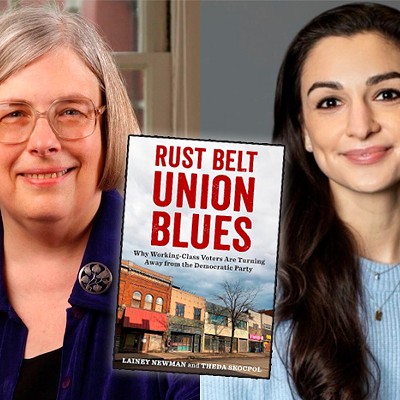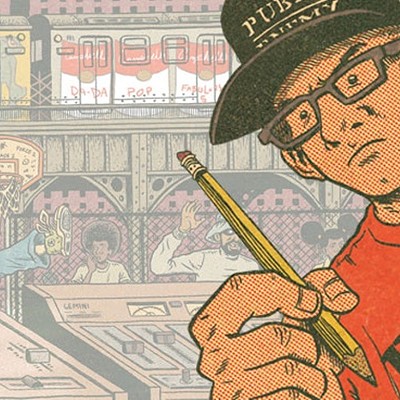For three decades, Gutkind has championed "creative nonfiction," a genre capable of embracing everything from journalism to essays, histories and memoir, but basically consisting of the artful telling of truthful narratives. As an instructor at the University of Pittsburgh, Gutkind, now a tenured English professor there, claims to have been the first person in the country to teach creative nonfiction full time, nurturing countless writers. Ten years ago, the Pittsburgh native founded the journal Creative Nonfiction, which publishes little-known and local writers along with some of the biggest names in the business.
And for all this he's taken some heat. In a scathing 1997 essay in Vanity Fair, critic James Wolcott ripped the contemporary creative nonfiction "movement" as a fuzzy-headed fraud peddling emotionally needy confessions; Wolcott largely blamed Gutkind, whom he labeled "[t]he godfather behind creative nonfiction." More recently, in a May 2003 Harper's Magazine review diagnosing the sickliness of the contemporary essay, Cristina Nehring cited a preponderance of trivial memoir; Nehring, too, fingered Gutkind as a prime culprit and as "founder" of the creative nonfiction movement.
Yet Gutkind's writing -- except maybe his writing about writing -- has barely figured in the controversy. Almost all his books, including one about the working lives of baseball umpires, one about childhood mental illness, and 1990's award-winning Many Sleepless Nights: The World of Organ Transplantation, are intensively reported, closely observed works of journalism, well-regarded studies of milieus and lives explicitly not his own.
Until now. Gutkind's new book, Forever Fat, is all about Gutkind. His childhood, his transformation from aimless fat kid to self-disciplined achiever, his marriages, his writing career, his therapy sessions, his experiences with fatherhood.
In other words, it's just the sort of thing his detractors wish Gutkind's colleagues, students and admirers would cut out. It's also just what Gutkind thinks he needs to write at this stage in his career. He subtitles his book "Essays by the Godfather."
Gutkind grew up in Squirrel Hill, an unhappy Jewish kid with a raging father who often beat him. He was heavy -- about 220 pounds on his 5'9" frame -- and a poor student. On graduating from Taylor Allderdice High School in the early 1960s, his priorities were escaping Pittsburgh, escaping his family and escaping the humiliations of his overweight adolescence, not necessarily in that order. He took a bus to Atlantic City to join the Coast Guard, the only branch of the service that would have him.
As detailed in Forever Fat's title essay, the Coast Guard changed Lee Gutkind for good. There he developed a sense of self-respect that helped him shed weight and get fit; in the New Jersey base's little-used library, he also rediscovered reading. A few years later, at the University of Pittsburgh, an instructor in freshman English nonchalantly complimented one of Gutkind's essays, thereby launching a career.
Gutkind became an essayist and features writer, specializing in participatory journalism. He clowned for Ringling Brothers, wrangled at a rodeo, sparred with Bruno Sammartino. Researching a Sports Illustrated article, he became a member of a distinctive religious group, Judo and Karate for Christ.
This was, after all, the era of the New Journalism, with writers such as Tom Wolfe, Hunter S. Thompson and Gay Talese composing their in-depth, often participatory reports with personal style and literary flair: setting scenes to create dramatic tension, reproducing dialogue, and sometimes directly flouting standard journalistic practice by making themselves characters in the story or adopting the subjective inner voices of their subjects.
Gutkind identifies such factual-but-literary writing as its own genre, one distinct from pure fiction and conventional journalism alike. He calls it "creative nonfiction." Others prefer "documentary narrative" or "literary journalism."
By any name, in the '90s it hit its stride, not least with Gutkind's founding in 1993 of Creative Nonfiction (current circulation: 7,000) and Pitt's creation a few years later of a master's program in creative nonfiction. There are now 15 or so such master's programs in the country, compared to none when Gutkind started teaching. Increasingly, even newspaper writers today take a narrative approach to reporting, going beyond simple documentation. And starting in the mid-'90s, with such top-sellers as John Berendt's Midnight in the Garden of Good and Evil and Frank McCourt's Angela's Ashes, there was a surge in book-length creative nonfiction. Much of it -- from Angela's Ashes to Katherine Harris' The Kiss -- was memoir.
Memoirs in particular came under fire for sometimes honoring the "creative" over the "nonfictional" -- fabricating facts to improve the story, a practice Gutkind condemns. But critics also noted an increasingly confessional tone. Though reportorial in theory, in practice, wrote Vanity Fair's Wolcott in "Me, Myself, and I," creative nonfiction is "a sickly transfusion, whereby the weakling personal voice of sensitive fiction is inserted into the beery carcass of nonfiction. Creative (fiction) writing and creative nonfiction are coming together, I fear, to form a big, earnest blob of me-first sensibility" in which "writing is primarily self-expression, not a voyage out but a foraging in." Confessionals, wrote Wolcott, function solely to "promote empathy," and nowhere more so than in Creative Nonfiction.
After Wolcott's broadside, says Gutkind, "the first few days I was feeling kind of shaky." Then, someone congratulated Gutkind -- he'd been excoriated in a national magazine. That meant he'd arrived, and it made Gutkind proud of all he'd achieved.
It also made him think more about what he still wanted to do. For years he'd disciplined himself to get up to write at 4:30 a.m. every single day of the year. And even if most of Creative Nonfiction was memoir and personal essay, most of what Gutkind himself wrote consisted of immersion-style journalism -- spending four years with patients, docs and families to research Many Sleepless Nights, for instance -- and instructional guides such as The Art of Creative Nonfiction: The Literature of Reality.
Critiques such as Wolcott's puzzled him. "I've always found it amazing that people were attacking me for this form that I never used," Gutkind says. "I tell my students, I advise everyone, especially early in their career, not to do [memoir], and I'm getting creamed for it."
But critics be damned: The fat kid who'd made himself trim -- whose mottos include "Fall down nine times ... get up ten" -- had a plan, and he wasn't budging from it. He wanted to write his own memoir.
Gutkind agrees essays should strike a common chord with readers, linking the personal to the universal. Yet most writers, including most writers in Creative Nonfiction, "spend too much time talking about their own problems without thinking as much as they should about how their problems should resonate with readers," he says. "I like to think that the challenge of creative nonfiction is not writing, but thinking: Trying to figure out what things mean in a larger context."
Roughly half of the pieces in Forever Fat were previously published in Gutkind's earlier books or Creative Nonfiction. Topics include childhood reminisces, a detailed account of the author's medical experiences (and another of his nine years of psychotherapy), his warfare with his father, and the title piece's exhumation of the heavyweight loser -- the "fat fucker," Gutkind calls him -- who still lives inside him. There's also the introductory riposte to Wolcott -- one of the people to whom the book is dedicated.
Sitting in a favorite hangout, the Forbes-Shady Starbucks in Squirrel Hill, Gutkind characterizes his journalism as a kind of training for his memoir writing.
"I purposely chose to do this immersion work in great substance first before I ever wanted to write about myself," says Gutkind, gray-haired and beyond prof-casual in his faded jean jacket and turquoise stud earring. "I felt that I really needed to have these experiences, especially the last three or four [books] that circled around life-or-death issues in the medical world. ... It took me nine years of therapy to explain and it took me the four years in the transplant world [with] the tenuous experience of watching not just the patients, but the families and the surgeons, to begin to understand my own fears and vulnerabilities."
Yet whatever detractors might say, Gutkind feels vindicated: An early review of Forever Fat, in Publisher's Weekly, said, "This collection of beautifully crafted personal essays ... demonstrates the author's mastery over his chosen genre." "The Godfather Tour" of readings and workshops -- having already passed through Baltimore, Wyoming and Tennessee -- will by year's end also wind through Colorado, Seattle and New York City. And along with a book on robotics, he's hard at work on a sequel to Forever Fat.
But while Pittsburgh City Council has declared the first week of November "Creative Nonfiction Week," recognition of Gutkind's talents doesn't always begin at home. A Nov. 3 reading here will be the first Lee Gutkind reading Pitt has sponsored. And in publishing Forever Fat, he went with the University of Nebraska Press, which has a strong niche in memoir that Pitt lacks. More memoir is to come. The Forever Fat sequel will chronicle his cross-country trips with Sam, his 12-year-old son from his second marriage.
Discussing the discipline he writes about in Forever Fat -- a theme binding his experiences with distance running, his writing and his academic career -- Gutkind segues into talking about Sam. Gutkind started running with him after deciding the boy needed exercise; they just completed their first half-marathon together, an Atlantic City road race which Sam, Gutkind says proudly, was the youngest person to finish. Then he notes that he's Pitt's only tenured professor without a post-graduate degree. "It's something I wanted, and I set out to try to make it happen," he says. "Not that it works all the time. But I think that's the way you become a writer."














